Kyle Garret's Blog, page 4
June 16, 2020
A Eulogy for The Magicians, Part 2: Magic Comes From Pain
What a silver fucking lining, right?
It’s kind of a tricky concept and one which is thrown around on the show with far too little explanation or examination.
Does it mean that every single magician is always in pain? Are those who are in more pain thus more powerful magicians? What does studying have to do with it?
I think that the pain is meant as a trigger for the magic, allowing someone to access it, and what they do with it — how powerful they become — is from that point up to them.
It’s like a cosmic balancing of the scales.
I think that’s a reasonable explanation in and of itself, but in the first season we see Quentin perform magic that is stronger than any spells he’s ever done before, and it happens as a result of him finding out that his dad has brain cancer.
Quentin had already had pain in his life up until this point and he was already a magician, so his power burst suggests that the greater the pain, the greater the magic, which is a slippery slope.
Later, the group casts a spell to rid themselves of their emotions so they’re better able to perform battle magic. That seems to be at odds with what we’ve learned.
Or maybe not. Because you have to assume that the pain that triggers magic has to exist below the surface and, more often than not, is always there. It doesn’t necessarily manifest itself on the surface or every day.
That kind of informs what kind of pain they’re talking about. It doesn’t come and go like a lot of extreme emotions do — emotions that would interfere with battle magic. The pain runs deep and it’s constant. It’s a part of you. That’s the kind of pain that makes magic happen.
When Julia loses her magic towards the end of season 4, it’s not because her pain has gone away, it’s that the magic her pain triggered was gone. Magic is fleeting even in the best of times. Your magic is born of your specific pain and if that magic goes away, your pain doesn’t just create new magic. It’s linked to that specific magic and once it’s gone, there’s no getting it back…
…unless you find new pain that will never go away. Season five has plenty of faults, but it did a great job of articulating how each character was permanently changed by Q’s death.
I think it’s important to make the distinction that magicians can still be happy. I don’t think this ever explained outright on the show (maybe in the books, I don’t know) but I think it has to be the case or else magicians are doomed from the start. It’s possible to carry around deep pain while still living a happy life. It may sound contradictory, but I think it’s how most people walk through life.
I also don’t think there are degrees to this. I don’t think that you can put a grade on pain. Everyone experiences it differently and regardless of what the triggering event is, the feeling is what matters. Could you make the claim that, say, Eliot’s life was harder than Julia’s? Sure. But that’s not what it’s about. It’s about something that sears you to the core and never leaves and all of the magicians had that.
It kind of sets up the idea that every character on the show has a secret of some sort, or at least a past that maybe they don’t talk about. There’s something heavy in Todd’s past, for example. That informs the entire show.
And, honestly, for all the ups and downs of the show, that through line is always there. Pain isn’t just the origin of magic, it’s the origin of The Magicians.
June 15, 2020
A Eulogy for The Magicians, Part 1: The Space Between
When Quentin finds his way to Brakebills University, he has spent his life trying to reconcile two worlds, the one around him and the one in his head.
The one around him is dark and depressing. In the first season, the real world is shot in shades of dark blue, grey, and black. Existence is drab. It’s depressing. And it’s often overwhelming.
But for Quentin there’s another place, one that’s full of life and color. That place is Fillory, the fantastical realm from a series of Narnia-esque books. Those books, and all the branches that grow off of that tree, are what has kept Quentin going for most of his life. The idea that there is something bright and wonderful somewhere out there has helped him barely hang on, and sometimes even that hasn’t been enough.
Brakebills University is the space in between.
We already know that the real world has failed Quentin, and over the course of the show we will see that Fillory will ultimately fail him, too. But Brakebills, that space in between, never does. It’s there, not in Fillory, where he is the most alive. It’s there where he finds joy, where he finds feeling.
And consider where he died — in the space between the land of the living and the land of the dead.
That’s what the Magicians was for its fans, just enough fantasy to help us escape, just enough reality to help us feel less alone. It was real enough to make me cry, but magical enough to help me escape for 40+ minutes at a time.
That space in between that was Brakebills extended to the group the show revolved around. Each of them had reasons to need the space that Brakebills gave them, that allowed them to be themselves, to become themselves.
Even when he first meets his friends, Quentin ends up in the space in between. Eilliot and Margo take him under their wing from the start, drawn to him for some reason. At the same time, both Alice and Penny are antagonistic towards him, for reasons that later become clear.
If it seems like I’m framing the show around Quentin it’s because it was, because Quentin himself didn’t fall into a dichotomy. Jane Chatwin actually gives some examples of this in the second episode, how he’s smart, but not a genius, a magician, but not a particularly good one. He’s not remarkable, she says.
But Quentin wasn’t a character torn between worlds; he belonged in neither, it’s just one actually meant something to him. One was a fantasy, the other reality. This is what made him different, what made him so great, and so appealing to so many people.
Quentin occupied the space in between, a space the show itself also filled, right up until the day he died, right up until the day the show ended.
June 11, 2020
Peter Parker Must Die!
Peter Parker needs to pull a Barry Allen (but not come back).
The world is ending and when the world ends I tend to look for comfort and I find that comfort in the form of comics. I’m sure I’m not alone.
As I was rereading some of my favorite comics, I decided to check in on some of the characters I’ve since stepped away from, in this case Peter Parker, the Spectacular Spider-man.
One of the things I realized as I was looking at years and years of Spider-man comics is that Spider-man isn’t as popular as he used to be. And it’s not just that, he’s also not a much of a comic book brand anymore, and that’s really surprising.
The (Lack of) Spider-FamilyLet’s look at Batman. How many Bat books are released every month? More to the point, how many of them are connected to Batman? How many of them would be drastically changed if Batman went away?
Well, we know. Grant Morrison killed off Bruce Wayne a few years ago and the entire line of Batman books was altered. Bruce Wayne is essential to Nightwing, Batwoman, Batgirl, Catwoman, the Outsiders, and on and on. With the possible exception of Harley Quinn, every Bat branded book connects with Bruce Wayne.
It’s amazing, really, how DC has been able to franchise Batman the way they have. Whenever people wonder if DC will fold for some reason or another, the answer will always be “no” if not just to maintain its IPs, but because books with a bat on it will always sell.
I mean, the Red Hood has had his own book for nine years!
The longest running Spider-man spinoffs have always been other books starring Spider-man. Spider-woman is getting yet another new title. Ghost Spider has been through more than a few. There have been a number of Spider-girl comics starring different characters. And most of those titles had very little to do with Peter Parker.
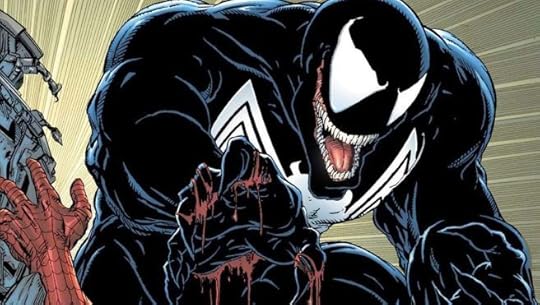 Venom’s popularity ebbs and flows, but at least there’s a connection to Peter.
Venom’s popularity ebbs and flows, but at least there’s a connection to Peter.
The title and character that have had the longest run and have managed to maintain a fairly consistent level of popularity is Miles Morales. But how much does Peter Parker really have to do with Miles?
At this point there’s more of a Wolverine family than there is a Spider-man one.
Old Man Spider-manThe other problem that Peter Parker has is that every other iconic superhero is eternal. None of them age, not to any real extent. They might mature and grow, but you can stretch their entire histories out over the course of a few years. They’ve always been static.
That hasn’t always been the case for Peter.
Consider the Peter Parker we see in other aspects of popular culture, namely the movies. We always get the high school version, maybe the early college years. But we always get a young Peter Parker, not one who has found his place in the world.
That’s the thing about current day Peter Parker: he has a full life. Whether he’s a scientist, the head of a company, an author, or married to a supermodel, he hasn’t been the lovable loser of his origin in decades. Even when his marriage was erased by the devil, he was still old enough to have options. He’s successful. The Parker luck just isn’t what it used to be.
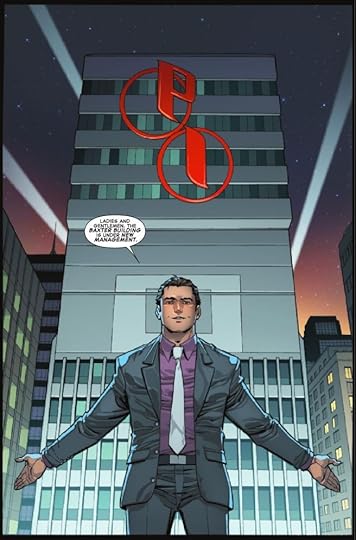 Seriously? He owns the BAXTER BUILDING??
Seriously? He owns the BAXTER BUILDING??So if the version of him in mainstream media isn’t at all the version of him in comics, and given that people who see the movies don’t actually go buy the comics, anyway, why are we holding on to him?
He’s not essential to any spinoff titles, at least not in a way that requires him to be alive.
He is the epitome of superhero comics inability to just move the hell on.
He offers nothing but nostalgia at this point. There’s nothing that he does that can’t be done by dozens of other characters. They had him make a deal with the devil in an effort to make him relatable again! He’s an Avenger, he’s an adult, and he’s run his course.
Just let him go.
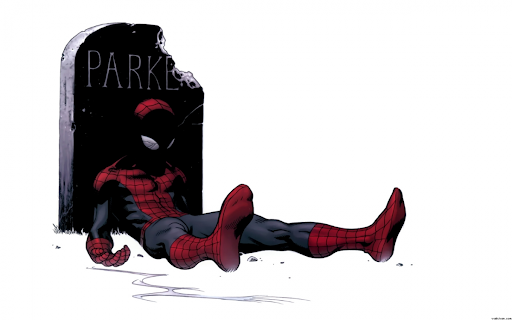
When the current Spider-man movies end we will again find ourselves in a situation in which people will try to figure out how to bring him back to the big screen. And at this point, hasn’t Peter Parker been done to death? Wasn’t one of the best movies of last year Into the Spider-verse?
It feels like Marvel is holding on to Peter Parker because they are afraid to lose the stunted fanboys who will swear up and down that they will never read another Marvel comic again if Peter dies. But they won’t do that, will they? They never do.
Yes, I realize that the Miles Morales Spider-man comic currently sells half of Amazing Spider-man, but a lot of that is the fact that the book is called Miles Morales Spider-man and not Amazing Spider-man. Make Miles the main character in that book and I ‘d be shocked if the drop in sales was really that drastic.
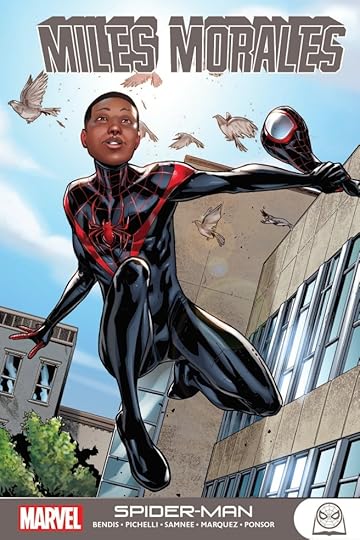
Besides, Marvel could (and would) turn the whole thing into a huge event. They did it in the Ultimate universe and it sold really well. Imagine what would happen if they did it to the real deal.
Miles Morales would become the only Spider-man, a teenage Spider-man that would have relevance again. Because that’s the thing about Marvel in general and Spider-man specifically: success comes from relevance to the real world. It’s what made Marvel different from DC.
And it’s been gone for a long while now. Making Miles the only Spider-man makes the character relevant again.
Then Marvel can do what it’s been dabbling at for a while now: expanding the Spider-man universe with Miles as the center.
Spider-woman already has a relationship with Ghost Spider, Ghost Spider has a relationship with Miles. Bring in Silk, bring back a Spider-girl, connect with Venom, and go. Get bold creative teams, make a big deal about the relaunch, and introduce the world to the new Spider-man family.
Suck it up and do the right thing, Marvel. Send Peter Parker off into the sunset and make Spider-man relevant again.
June 8, 2020
Poor some out for the parent shaming bloggers
I don’t know if you know this, but you should never, ever use a phone or any other piece of electronics around your children. They will think that the phone is more important to you than they are and they will soon go feral, run away from home, and join the circus.
It’s basic science.
Oh, and don’t even get me started on screen time! Children should never have screen time until they are five and then after that only PBS and the Smithsonian channel. Maybe they can FaceTime with the underprivileged child from a 3rd world country that they are sponsoring in lieu of getting toys, but that’s just once a week or so, assuming they get the iPad we sent.
I would hazard to guess that there are millions of parenting blogs, most of which no one ever reads. But there are those special few that get a ton of traffic and a substantial percentage of those seem to exist just to tear other parents down. Not all of them are malicious, but they tear down other parents just the same.
But now the pandemic has hit and all of their advice and riding of the high horse has come crashing down. Their kids are home all day long and they’re buying whatever groceries are still left on the shelf and maybe they have to work from home, too (doubtful), but it’s all different. Instead of allowing their children to experience big, developmental moments in a safe, unobtrusive environment, they have to teach them math.
These bloggers are part of the reason why parents are freaking the fuck out right now. A lot of us are pulling off the trifecta of parent/employee/teacher and it is really hard to do anything but the bare minimum.
But the bare minimum is amazing and most parents don’t understand that because they’re comparing these days with the pre-pandemic days, days when the bar for parenting was these stupid, condescending blogs.
The bare minimum is keeping your kids happy and healthy and still managing to teach them a few things here and there. The bare minimum is letting them know that despite all the chaos of the world, they have order at home with you, and nothing that happens outside can influence how you feel about them.
The bare minimum is comforting them and listening when they meltdown and knowing that not everything that happens these days is happens in the moment. We’re all powder kegs.
The bare minimum is understanding and love.
Sometimes I feel guilty that I let our older son play Pokemon Go for long stretches of time while his younger brother plays and my wife and I work, but sometimes that’s what it takes. I feel bad that our older son has never really been encouraged to play by himself before and that now, with so much around him being uncertain and scary, he more adamantly refuses to even try.
I feel bad that our younger son is often fine playing by himself for periods of time during which I’m doing other things because I have to. I feel bad that he’s not getting the same kind of attention that his brother got or, at this point, even the same kind of attention that he got a few months ago.
I often feel like I’m doing every single thing poorly. I feel like I’m I’m trying to keep so many plates int he air that they are all on the verge of crashing down. And in this case, two of those plates are my children.
But I know I’m not alone. It’s amazing how being stuck at home with your family for weeks starts to smooth the peaks and valleys of parenting. There are still the haves and the have nots, of course, but suddenly all those bloggers who reveled in talking about what great parents they are have to deal with the same unbelievable circumstances as the rest of us.
And maybe, just maybe, they’re realizing that all their supposedly amazing parenting is a result of incredible privilege.
That’s unlikely. But maybe the parents who aspire to be these bloggers will finally see them for what they really are. And maybe they’ll start to give themselves a break.
April 5, 2018
Superman: The Triangle Years, Part 1 – Embrace Continuity
Bold statement: Superman’s glory days happened during the Triangle Years in the ’90s.
I can understand if that sounds insane, particularly since I’m making the above statement as someone who loves the hell out of Silver Age Superman. If you’ve never read Superman stories from the Silver Age, you really should. They are bat shit insane. Seriously. They make absolutely no sense, and as a result are wonderfully creative. There’s not even a germ of characterization to be found, either.
But, like I said, the ’90s are where it all came together for the Man of Steel. Yes, it was a decade full of dark, gritty, extreme superheroes, but that’s part of the reason why Superman thrived; he was the antithesis to all of that, even when he was running around in a black suit armed with automatic weapons (that only happened in a few panels). The Triangle Years emphasized the things that made Superman a singular character, although it was a work in progress, one with its fair share of missteps.
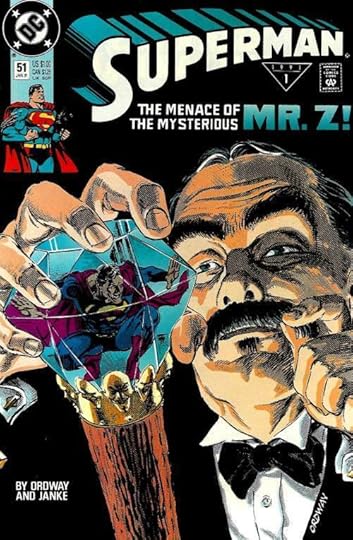 Superman #51 cover by Jerry Ordway
Superman #51 cover by Jerry Ordway
Some context: the Triangle Years refers to the main Superman comics published from January 1991 to January 2002, all of which (as well as a few one shots) featured a triangle emblem on the cover. That emblem held a number which indicated the order in which the Superman family of titles should be read. There were only 3 Superman books when the Triangle Years began (Superman, Adventures of Superman, and Action Comics). Within the first year a fourth title, Man of Steel, would be added, and eventually Man of Tomorrow was introduced as a quarterly book to fill the 4 weeks a year that would have otherwise been Superman-less.
In the narrative sense, the Triangle Years were set up a year earlier, in 1990. The three Superman titles were becoming more and more interconnected. The last six months of Superman comics in 1990 featured 4 crossovers, so the average fan already had to read every title as it was. Superman editor Mike Carlin’s decision to add numbers to the covers to help readers follow along just made sense.
But the Triangle Years would become something more than just a simple numbering system. The narrative changed not long after it started. The focus evolved.
Much of this was a result of what the Superman titles had been doing over the previous few years. After DC’s big Crisis, Superman was relaunched by John Byrne, who set out Marvelizing — um, humanizing the Man of Steel. This is something of a reoccurring problem for Superman, as every few years someone decides they need to make him more relatable. More often than not, the outsider angle is the one that’s used, to varying degrees of success.
I’m not saying you can’t humanize Superman. I think, in small doses by talented creators, humanizing Superman can be great. But I think in many ways it misses the point of the character.
Superman is meant to be aspirational. What happens to Superman, what happens to Clark Kent, is only half the story. Equally as important is what happens to those who are influenced by him. Superman is and always will be just as much a presence as a person. He’s an icon, and bringing him down to our level removes a lot of what’s great about the concept.
Now, whether Carlin and his chosen teams of writers and artists just weren’t able to get a handle on Superman as a regular guy or whether they decided that was a bad direction to go in, I don’t know. But that’s ultimately how it worked out, and the Superman titles were the better for it.
The Superman offices were going to create (then) 88 pages of comics every month, 1,144 pages a year, not including specials and annuals. They were able to keep these stories interesting by exploring Superman’s supporting cast. This included paying special attention to the two most important people in his life: Lois Lane and Lex Luthor. Lois grew into a powerful force in her own right, while Luthor experienced perhaps more ups and downs over the course of the 90s than ever before.
The Triangle Years were just as much about the impact Superman had on those around him as they were about the man himself. In this respect underscored what makes Superman a singular character in all of comics.
NEXT: It begins.
The post Superman: The Triangle Years, Part 1 – Embrace Continuity appeared first on KyleGarret.com.
October 17, 2017
I had a really great conversation about Jesus
I suppose it’s rare in this day and age to have enlightening, intellectually stimulating conversations with people who hold different beliefs than you. But it happened. And it has stuck with me.
The person I was talking to is a Christian, a liberal Christian, who was raised in the faith and who has built her life around it. She is the real deal. She was talking to me about how she got through some hard times in her life.
She mentioned that, for her, Jesus is the embodiment of God’s love, and since fear is the opposite of love, living in fear means moving away from God. Since she wanted to live with God, she regularly chooses to reject fear and embrace love.
Her roommate in college was a religious studies major and she kind of implied something even more interesting: that Jesus was the idea of love, a concept given physical form.
This fascinates me.
I’m not Christian and, for the record, I don’t think Jesus ever existed. The few documents that would “verify” such a thing were very clearly written well after Christianity was established, inserted into older texts in an effort to legitimize what the Roman government was trying to install.
But what if that didn’t matter?
Let’s consider Jesus as the idea of love, an idea that is often too abstract for people to grasp, so someone, somewhere, decided to create an embodiment of love, a person for those who have trouble with the idea of love. He’s an avatar. He’s only real in the sense that some people need him to be real to translate a language that is normally foreign to them — that language being love.
Love isn’t exactly an easy concept to accept or even understand, particularly these days. It’s not a priority, not for the majority of us. I can’t imagine it’s ever been, given that humans have been fighting for centuries just to survive. What good is love when you’re struggling to get by? Can you eat it? Can it buy you a warm bed? Will it protect you from bullets?
Hell, I have lived an incredibly privileged life and for most of that love was for hippies and people who didn’t know any better. The idea of love as a powerful force in the universe that could alter our entire reality? Smoke another bowl, hippie.
But it’s true. I realize that love still doesn’t help people who are hungry or homeless or bombarded by bombs. But it would if it convinced others to love. Love would help them if the rest of society took care of each other, if we stopped making war and started building a world. And that’s the thing with love; its impact isn’t always direct, so it’s often easy to dismiss.
Love is an abstract concept, yet we all have an idea of what it is. It is often not the same idea and that can be a problem.
And so we have Jesus, ostensibly created not just to give people a manifestation of love that they can believe in, but to also create a universal definition for love.
I think that’s great.
I have no problems with people choosing to believe in something that I don’t. I am the last person who will ever question belief, who will ever condemn faith. My entire life has revolved around having blind faith in myself, even when I shouldn’t.
I have my concerns about the foundations of Christianity and I have many, many issues with how it currently operates, but I am all for a central concept of love that is actually love. I’m all for people being able to embrace that even if it requires a magical being.
I just wish that concept of universal love was actually universal.
The post I had a really great conversation about Jesus appeared first on KyleGarret.com.
August 8, 2017
Faith No More’s “Angel Dust” is Gloriously Adolescent
I don’t mean that the album is transitional, I mean that the album is the perfect encapsulation of being a teenager, perhaps more specifically a white boy not living in a city.
I would love to think that my teen years were grunge, but that’s probably more the romanticized view than anything else. The reality is that no single record portrayed the overall creep factor of raging hormones than “Angel Dust.” No other album dipped into the inner and outer turmoil the same way, to the same degree. This wasn’t just “I’m lonely and sad and no one will ever love me.” This was “here are all the fucked up things going through my head.”
“Land of Sunshine” comes off as this horrible double edged sword of “congrats, grad!” and “you might be right, you might be insane.” They seem to be such disparate ideas, yet it’s exactly how any weird teenager feels. On one hand, you’re focused on a theoretical future where you might actually feel good about yourself. On the other hand, you regularly feel horrible and you’re pretty sure you shouldn’t, but you can’t help yourself.
Follow that up with “Caffeine” which, among other potent lines, includes: “Relax. It’s just a phase. You’ll grow out of it.” It’s like a fucked up user manual of reassurance. Yes, you are a freak, but it’s cool.
The beauty of “Midlife Crisis” is that it’s exactly the kind of song someone terrified of a theoretical midlife crisis would write. I can remember being a teenager and being terrified that I would end up like my parents who, at the time, were probably experiencing their midlife crisis. In some ways this was the greatest fear that a white kid in the suburbs could have: becoming another suburban parent.
And this leads beautifully into “RV.”
When I listened to this in high school, I thought it was fun, a cool song that was making fun of sad, white trash. Listening to it now, though, I realize how poignant it is, how complex the song is not just lyrically, but musically. What starts off as a caricature becomes a real person by the end, particularly with that last line. It some ways, this is a cautionary tale, a warning that listening to your parents isn’t necessarily a good idea.
While “Smaller and Smaller” instantly conjures images of bugs that will not die, the song itself is something of a rural anthem, a musical take on the plight of the farmer who is slowly being beaten down by the modern world. Again, this record isn’t about the city folk, it’s about those of us in the suburbs and the country.
“Everything’s Ruined” comes back to the idea of family being an investment and parents looking at their children as a way to increase the status of the family name, not to mention the the family fortune. Again, for a kid in the suburbs whose life has been mapped out, this was like heroin. Th song is telling us that if we don’t turn out the way our parents want, they will consider the whole ordeal to have been a waste.
Is “Malpractice” about how horrible it is to try to appeal to the masses? Maybe?
“Kindergarten” is clearly about a kid who is held back in kindergarten, but in this case it seems as if he will never get past kindergarten no matter how old he gets. This is stunted adolescence taken to the next level; this is perpetual childhood, but not in a good way. This is the story of a person who needs to grow up, who wants to grow up, but is unable to move forward. This could very easily be about a teenager, but setting it in a kindergarten makes it substantially more resonant.
Faith No More’s greatest accomplishment could be getting straight teenage boys across the country to sing “I swallow” at the top of their lungs. “Be Aggressive” might be about more than blowjobs, but it would take a better person than I to dig into it.
I played soccer in high school. I was pretty good at it, too. Every year my school had an awards banquet for the sports that played in the fall, which was usually dominated by football. But after the main banquet, the individual sports had their own awards ceremonies. I remember that my brother, who was the assistant coach at the time, told me in confidence that the MVP voting had been a tie between me and another guy, and that we’d likely have to vote again. But that never happened and the head coach gave it to the other guy, apparently because he felt like it. Had I just voted for myself, it would not have been an issue.
Anyway, on my way home that night I listened to “A Small Victory.” At the time, it was mostly for the vague references to sports and competition. Listening to it now, I see that it’s about someone who just cannot win, but at the same time questions why competition is something that drives us. My reading is that, in the end, the continual loser is the one who realizes that this competition is meaningless, but the winner won’t listen to reason.
Sounds about right.
As near as I can tell, “Crack Hitler” is about a drug lord. The lyrics paint a pretty good picture, from setting the song in Miami to the briefcase, the high speed chase, to evil lurking in every person’s heart. Calling the song “Crack Hitler” is certainly sensational, as crack was still destroying communities like the plague and, well, Hitler is Hitler. So if we’re looking for a crossroads of awful both near and far, this is a good one.
The brilliance of “Jizzlobber,” aside from the name, is that it encompasses the entire album. Again, this is teen angst delivered with a different type of self-loathing that we got from other bands of this time. This is a dirty song with a dirty title and dirty lyrics and we all felt dirty all the damn time when we were teenagers. And this song was Faith No More looking over the 11 other songs on this album and saying “you are disgusting, but we get it.”
Closing the album with a instrumental piece called “Midnight Cowboy” is just about perfect. Aside from the fact that it’s the perfect come down after such an intense album, the reference to “Midnight Cowboy” hammers home a lot of what this album was about. The layered, heavy music over top of the kind of simple melody you would expect to find being performed at a quaint, old world restaurant summarizes the album nicely: we are following a pattern that has always existed and it really is more fucked up than ever.
“Angel Dust” is the perfect teen angst record for a specific demographic and it was more telling than I realized at the time. It’s not the way I wanted to feel or even how I thought I felt, but what I actually experienced every day. And it transforms me back into a teenager every time I hear it.
The post Faith No More’s “Angel Dust” is Gloriously Adolescent appeared first on KyleGarret.com.
July 29, 2015
I'd get a lot more done if I didn't regularly think that none of it matters.
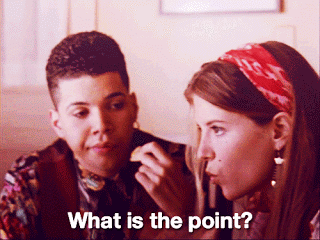 This should make my wife happy.I drink when I write.
This should make my wife happy.I drink when I write.I don’t do it because I feel like I can only be creative if I’ve got alcohol in my system, although I will admit that it’s much easier to access that part of my brain with some liquid assistance. I’ll also admit that it’s fun to read something I wrote the night before and be surprised at how good it is. But, no, I don’t use alcohol as a form of inspiration. I don’t need it to actually create.
I need alcohol to get past the feeling that none of it matters.
I should point out that this isn’t always the case, but it’s close. My “writer’s block” isn’t that I don’t have anything to write about, it’s that I don’t think any of the things I’ve got in my head are worth the time and effort. Is the world screaming for another YA book? Is my life so interesting that it needs to be shared? Why would anyone read a review of “Rise of the Midnight Sons?” Who even reads my blog anymore?
I am so envious of people who can just sit down and write for pleasure that it sometimes make me want to kill them.
Being content to write for pleasure is a foreign concept to me. I like to think that, if I were paid to write, it would be easier. That somehow financial compensation, which also suggests that people are actually reading my work, would motivate me, would convince me that what I’m doing is worthwhile. And as much as it pains me to say it, I think that’s true. I think even validation in the form of money would be enough.
But there are very few people who get to do that.
So how do I explain those who write for fun? Those who are content to sit at their computer, submerged in the reality of their work, unconcerned about whether or not anyone will actually read what they’re writing? Who are these people who are happy enough to be able to do that? Why doesn’t that seem like a waste of time to them?
I suppose the answer is in the question. They’re “happy enough to be able to do that” because writing makes them happy. So it’s not a waste of time.
But that’s not who I am. I love having written. I love going to write. I have a complex relationship

with the actual writing. I very often don’t see the point in it. It takes everything I’ve got just to sit in front of my computer and even then whether I actually get any work done or not is a crap shoot.
Instead I could look at our finances. That’s important. I can check my work email – I get paid for that. I can work on my to do list. I can go on Twitter and Facebook and “talk” to people, which gives me immediate satisfaction. Writing is hard and it takes forever and I’d like some happiness right now, please.
Or I can play with my son, assuming he’s awake. I could spend some time with my wife since we never see each other anymore or, when we do, it’s while taking care of our son. Maybe we could have actual conversations. Maybe we could have a date.
I know that if I don’t write, I start to get even moodier than normal. It’s often Nicole’s go-to question when I’m in a funk or acting out (not unlike a child). “Have you written lately?” Because she knows that it’s an indirect form of therapy for me. Even if I’m not writing about myself, the act of creating has a positive impact on me. But that positive impact is often hard to see until I’ve actually done it.
There are so many other things that have a positive impact on me, though. So many easier things.
So how do I do it? How do they do it? How do I just sit down and write, rest of the world be damned, need for validation be damned, need for immediate satisfaction be damned? How do I convince myself that this short story, this novel, this column, this review, needs to exist?
Why does this matter?
 Happiness isn’t reason enough for me to do much of anything, which is part of the problem.
Happiness isn’t reason enough for me to do much of anything, which is part of the problem.Happiness is being with my wife and son, but that’s not the only thing going on when I’m with them. I’m making both of them happy, too. I’m helping to raise our son. I’m doing something important, so I don’t question it. The validation for my actions is right there in front of me.
And maybe that’s why writing doesn’t make me happy while I’m doing it, because doing something solely to make myself happy isn't something I understand. I need a reason, and without one, I can’t accept doing it. If I don’t have a reason other than just because “it makes me happy,” then it won’t make me happy.
So I guess that’s the question, then: how do I accept doing something just because it makes me happy? How do I get past the need for it to be anything more and how do I get past that need being some kind of validation? How do I just enjoy the experience for what it is on its own?
I have no idea. Not a one.
It actually feels like the great hurdle of my existence, because I think it’s something that extends far beyond just writing. Even if it doesn’t, the impact it would have on my work would be huge.
The impact it would have on my liver would be pretty big, too.
June 3, 2015
They Always Want More
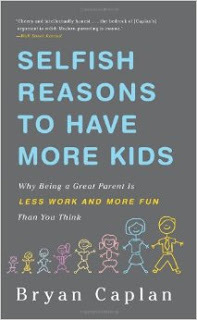 I would say that the Appleseed was probably less than a month old the first time we heard it.
I would say that the Appleseed was probably less than a month old the first time we heard it."When you have the next one..."
Or some variation thereof.
It's like when you get married and at the reception people start asking about when you'll have kids. You have your first kid and as soon as you're able to pull your head above water, people start asking you when you're going to have more.
Appleseed is not quite 14 months old and we are constantly learning new things about this process. The idea that we know enough to have a second child makes no sense to me, although I can see how it would be easier, but only if that second child existed in a vacuum, without an older brother that also required care.
Generally speaking, people seem to ask about a second (or third) child before mentioning what I gather to be completely inaccurate information regarding children with no siblings. I know more than a few only children and all of them are great people. They're social, they're as well adjusted as anyone else, and they're good friends. This idea that only children are somehow inferior or damaged because they never had siblings strikes me as ridiculous. The family you're born into is sometimes secondary to the one you create.
It's strange that only children have such a stigma about them. I suppose, perhaps, a bunch of horrible people
have been only children, although I just Googled it and Hitler was the 4th of 6 children, so having brothers and sisters isn't exactly a cure all for badness. It makes me think that perhaps this urban legend of the mentally unstable, emotionally broken only child is a way of making sure that people have more than one.
This is not to say I'm against having more kids. The other day I thought about the fact that Appleseed will be
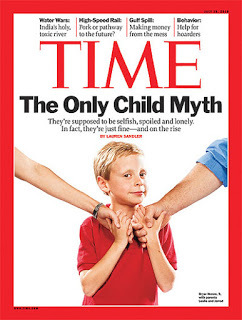 out in the world on his own really, as soon as he goes to school. I suppose technically he is now. But it occurred to me that a sibling would be a partner. A sibling would be another person he could count on, maybe another person to watch out for him and that he could watch out for. A sibling could be me (and Nicole) when we aren't there. Maybe not that directly, but at least a reminder of his parents, a reminder of what we'd say or do in any given situation.
out in the world on his own really, as soon as he goes to school. I suppose technically he is now. But it occurred to me that a sibling would be a partner. A sibling would be another person he could count on, maybe another person to watch out for him and that he could watch out for. A sibling could be me (and Nicole) when we aren't there. Maybe not that directly, but at least a reminder of his parents, a reminder of what we'd say or do in any given situation.And a sibling would be a friend.
But the idea of having more kids freaks me out. I often refer to Appleseed as "my favorite baby," but is that no longer true when we have a second kid? How do you divide up this feeling, this affection?
Here's the other thing: many, many people have described Appleseed as "sweet." Seriously, if I had a dollar for every time someone told me how sweet he is, I'd have a lot of dollars.
Now, part of that is his nature. He's fairly easy going toddler (he was a fairly easy going baby). Not many things upset him and those that do don't upset him for long. He's able to be happy in almost any situation unless there are a lot of people around. He has all the wonder of a toddler without all the angst, if that makes any sense. So describing him as "sweet" seems pretty obvious.
But there's also a nurture element at work and I'll admit I feel strange even writing that. But it's true. We
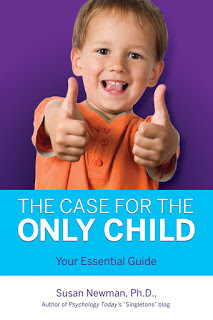 heaped so much positive reinforcement on Appleseed that it adds lift to his already happy demeanor. Happiness is a pretty easy thing to squish or to ignore, but we don't do either. There is a lot of joy in this house and I have no doubt that it takes root inside Appleseed. I know that we are nurturing that sweetness to the point where everyone who comes into contact with him notices.
heaped so much positive reinforcement on Appleseed that it adds lift to his already happy demeanor. Happiness is a pretty easy thing to squish or to ignore, but we don't do either. There is a lot of joy in this house and I have no doubt that it takes root inside Appleseed. I know that we are nurturing that sweetness to the point where everyone who comes into contact with him notices.What happens when all of that time and energy is suddenly divided? If helping my child to be the best version of himself he can be, doesn't that mean I need to be the best parent I can be? And how can I do that if my attention is split?
These are, of course, all hypothetical, high level questions. The reality of the situation is that something like money will probably play just as big a part in all this.
In the end, part of me feels like I'll miss all the time I get to spend with Appleseed now if I'm taking care of another kid, too.
May 27, 2015
Montage of Heck and Guns N' Roses
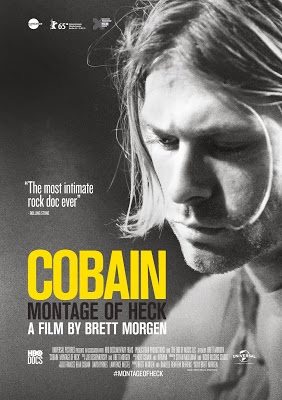 I saw "Montage of Heck," the documentary about Kurt Cobain, and for the most part I really liked it. It is, at moments, devastating, although not so much because of Cobain but because he was once a child and we know how his life ended. Show me anything about children these days and you've got me.
I saw "Montage of Heck," the documentary about Kurt Cobain, and for the most part I really liked it. It is, at moments, devastating, although not so much because of Cobain but because he was once a child and we know how his life ended. Show me anything about children these days and you've got me.Being a parent is hard.
Anyway, one of the things that stood out to me was how often he and his wife, Courtney Love, mentioned Guns N' Roses.
In theory, some of that would have come from the urban legend that has become the confrontation between Cobain and Axl Rose at some MTV awards thing, but I realized that said confrontation involved Cobain jokingly (in a dick move, I have to say) asking Rose to be his daughter's god father, which meant he was a father by that point. Yet he mentions Guns N' Roses before that.
So why? Why are Guns N' Roses a big enough deal to get mentioned more than once? He never even mentions any of the other Seattle bands more than once (if at all).
It reveals two things about Cobain.
The first, which is talked about in the documentary, is his ambition. For all of Cobain's supposed slacker aesthetic, he was very ambitious. While he never intended to be famous the way he was, he did want to succeed. He wanted his band to do well. He probably just wanted to be able to make a living making music.
But ambition has a way of moving the goal posts. Truly ambitious people aren't satisfied with their initial goals. And that's what makes the Guns N' Roses comments so interesting.
Nirvana marked the end of what we called "hair metal." It was the end of all those cheesy 80s bands with no substance and rather bizarre style. The music and the message mattered now. The image did not. I believe CC Deville, guitarist for Poison, actually answered the question "what happened?" regarding his band's decline in popularity with one word: "Nirvana."
Nirvana redefined popular rock music. Hair bands were over, grunge had arrived. But there was one band who was still topping the charts, and who were decidedly not grunge: Guns N' Roses.
It would be easy to make the case that these two bands represented two ends of the popular rock music spectrum. Given Cobain's ambition (and Rose's), it's easy to see why they would dislike each other, although it is a little surprising that Cobain would have been so upfront about it.
But that last bit is informed by the second thing it tells me about Cobain, something that's actually only
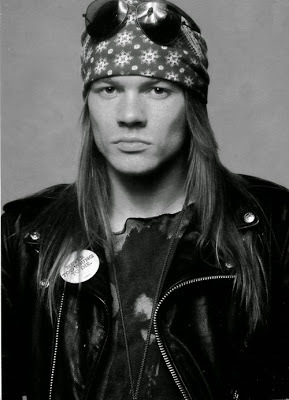 touched on in the documentary a bit, which I think is a mistake.
touched on in the documentary a bit, which I think is a mistake.Cobain represented a new type of masculinity.
Rose represented an old one.
Rose was (and probably still is), at the very least, a sexist homophobe. He sang about women as objects and he derided men who didn't behave in a manner he viewed as masculine. He was the worst part of those who have male genitalia and he was often glorified for it.
To Cobain, he would have been the enemy. He was the old guard, the disgusting, horrible old guard that was digging in and refusing to budge as the new regime took hold, a new regime that wasn't hung up on outdated definitions of masculinity, that believed in equality.
Rose also seemed to live his life without thinking, something Cobain was probably at least a little envious of. Even if Rose was a horrible person, there's something liberating in that, particularly for someone who gives a great deal of thought to every little thing. I say this from experience.
They were opposite ends of the white, male, rock star spectrum, playing tug of war with pop culture.
And Rose won.
It's not that Cobain killed himself that proves Rose's victory, because Rose himself would more or less go into hiding and has barely been seen since (that's actually an interesting parallel that deserves more thought, the fact that, with Cobain dead, Rose basically fell off the face of the earth, as if he no longer needed to exist). No, the proof is in the rock stars we got after that. Even during the high point of the "alternative" period, who do you think someone like the lead singer of, say, Creed takes after more, Cobain or Rose? And what did we get later on? Nu Metal. The pendulum was quickly pulled back where it was in the pre-Nirvana days.
I think we've seen some balance restored since then, thankfully, in part because of the impact Cobain had on youth culture. I think the rock bands of today are formed by the Nirvana fans of the past. And I think we're seeing them behave the way Cobain would have wanted, or at least in some watered down version.
Still, it's interesting to think of Cobain and Rose as the ying and yang of rock n' roll, and what that type of music meant to white dudes of the world.



